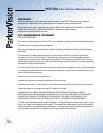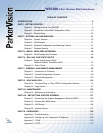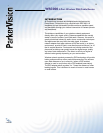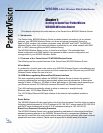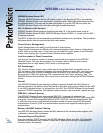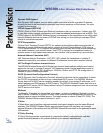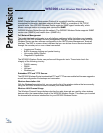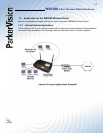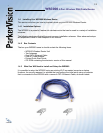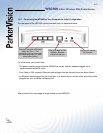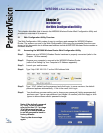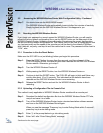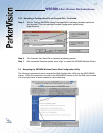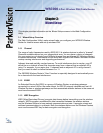
WR3000 4-Port Wireless DSL/Cable Router
®
10
Dynamic DNS Support
With Dynamic DNS support, you can have a static host name alias for a dynamic IP address,
allowing the host to be more easily accessible from various locations on the Internet. You must
register for this service.
PPPoE Support (RFC2516)
PPPoE (Point-to-Point Protocol over Ethernet) emulates a dial-up connection. It allows your ISP
to use their existing network confi guration with newer broadband technologies such as ADSL. The
PPPoE driver on the WR3000 Wireless Router is transparent to the computers on the LAN, which
see only Ethernet and are not aware of PPPoE thus saving you from having to manage PPPoE
clients on individual computers.
PPTP Encapsulation
Point-to-Point Tunneling Protocol (PPTP) is a network protocol that enables secure transfer of
data from a remote client to a private server, creating a Virtual Private Network (VPN) using a
TCP/IP-based network. PPTP supports on-demand, multi-protocol and virtual private networking
over public networks, such as the Internet. Use PPTP to connect to a broadband modem to
achieve access to high-speed data networks via a familiar “dial-up networking” user interface.
Network Address Translation (NAT)
NAT (Network Address Translation - NAT, RFC 1631) allows the translations of multiple IP
addresses used within one network to different IP addresses known within another network.
NAT for Single-IP-address Internet Access
The WR3000 Wireless Router’s SUA (Single User Account) feature allows multiple-user Internet
access for the cost of a single IP account. NAT supports popular Internet applications such as
MS traceroute, CuSeeMe, IRC, RealPlayer, VDOLive, Quake, and PPTP. No confi guration is
needed to support these applications.
DHCP (Dynamic Host Confi guration Protocol)
DHCP (Dynamic Host Confi guration Protocol) allows the individual clients (computers) to obtain
the TCP/IP confi guration at start-up from a centralized DHCP server. The WR3000 Wireless
Router has built-in DHCP server capability enabled by default. It can assign IP addresses, an IP
default gateway and DNS servers to DHCP clients. The WR3000 Wireless Router also acts as a
surrogate DHCP server (DHCP Relay) where it relays IP address assignment from the actual real
DHCP server to the clients.
Multicast
Traditionally, IP packets are transmitted in two ways - unicast or broadcast. Multicast is a third
way to deliver IP packets to a group of hosts. IGMP (Internet Group Management Protocol) is the
protocol used to support multicast groups. The latest version is version 2 (see RFC 2236). The
WR3000 Wireless Router supports versions 1 and 2.
IP Alias
IP Alias allows you to partition a physical network into logical networks over the same Ethernet
interface. The WR3000 Wireless Router supports three logical LAN interfaces via its single
physical Ethernet LAN interface with the WR3000 Wireless Router itself as the gateway for each
LAN network.
IP Policy Routing
IP Policy Routing provides a mechanism to override the default routing behavior and alter
packet forwarding based on the policies defi ned by the network administrator.




